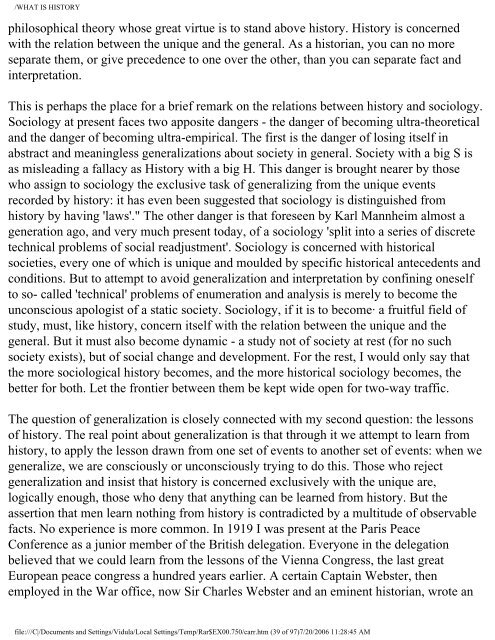What is History / by Edward Hallett Carr - Universal History Library
What is History / by Edward Hallett Carr - Universal History Library
What is History / by Edward Hallett Carr - Universal History Library
Create successful ePaper yourself
Turn your PDF publications into a flip-book with our unique Google optimized e-Paper software.
WHAT IS HISTORY<br />
philosophical theory whose great virtue <strong>is</strong> to stand above h<strong>is</strong>tory. H<strong>is</strong>tory <strong>is</strong> concerned<br />
with the relation between the unique and the general. As a h<strong>is</strong>torian, you can no more<br />
separate them, or give precedence to one over the other, than you can separate fact and<br />
interpretation.<br />
Th<strong>is</strong> <strong>is</strong> perhaps the place for a brief remark on the relations between h<strong>is</strong>tory and sociology.<br />
Sociology at present faces two apposite dangers - the danger of becoming ultra-theoretical<br />
and the danger of becoming ultra-empirical. The first <strong>is</strong> the danger of losing itself in<br />
abstract and meaningless generalizations about society in general. Society with a big S <strong>is</strong><br />
as m<strong>is</strong>leading a fallacy as H<strong>is</strong>tory with a big H. Th<strong>is</strong> danger <strong>is</strong> brought nearer <strong>by</strong> those<br />
who assign to sociology the exclusive task of generalizing from the unique events<br />
recorded <strong>by</strong> h<strong>is</strong>tory: it has even been suggested that sociology <strong>is</strong> d<strong>is</strong>tingu<strong>is</strong>hed from<br />
h<strong>is</strong>tory <strong>by</strong> having 'laws'." The other danger <strong>is</strong> that foreseen <strong>by</strong> Karl Mannheim almost a<br />
generation ago, and very much present today, of a sociology 'split into a series of d<strong>is</strong>crete<br />
technical problems of social readjustment'. Sociology <strong>is</strong> concerned with h<strong>is</strong>torical<br />
societies, every one of which <strong>is</strong> unique and moulded <strong>by</strong> specific h<strong>is</strong>torical antecedents and<br />
conditions. But to attempt to avoid generalization and interpretation <strong>by</strong> confining oneself<br />
to so- called 'technical' problems of enumeration and analys<strong>is</strong> <strong>is</strong> merely to become the<br />
unconscious apolog<strong>is</strong>t of a static society. Sociology, if it <strong>is</strong> to become· a fruitful field of<br />
study, must, like h<strong>is</strong>tory, concern itself with the relation between the unique and the<br />
general. But it must also become dynamic - a study not of society at rest (for no such<br />
society ex<strong>is</strong>ts), but of social change and development. For the rest, I would only say that<br />
the more sociological h<strong>is</strong>tory becomes, and the more h<strong>is</strong>torical sociology becomes, the<br />
better for both. Let the frontier between them be kept wide open for two-way traffic.<br />
The question of generalization <strong>is</strong> closely connected with my second question: the lessons<br />
of h<strong>is</strong>tory. The real point about generalization <strong>is</strong> that through it we attempt to learn from<br />
h<strong>is</strong>tory, to apply the lesson drawn from one set of events to another set of events: when we<br />
generalize, we are consciously or unconsciously trying to do th<strong>is</strong>. Those who reject<br />
generalization and ins<strong>is</strong>t that h<strong>is</strong>tory <strong>is</strong> concerned exclusively with the unique are,<br />
logically enough, those who deny that anything can be learned from h<strong>is</strong>tory. But the<br />
assertion that men learn nothing from h<strong>is</strong>tory <strong>is</strong> contradicted <strong>by</strong> a multitude of observable<br />
facts. No experience <strong>is</strong> more common. In 1919 I was present at the Par<strong>is</strong> Peace<br />
Conference as a junior member of the Brit<strong>is</strong>h delegation. Everyone in the delegation<br />
believed that we could learn from the lessons of the Vienna Congress, the last great<br />
European peace congress a hundred years earlier. A certain Captain Webster, then<br />
employed in the War office, now Sir Charles Webster and an eminent h<strong>is</strong>torian, wrote an<br />
file:///C|/Documents and Settings/Vidula/Local Settings/Temp/Rar$EX00.750/carr.htm (39 of 97)7/20/2006 11:28:45 AM







